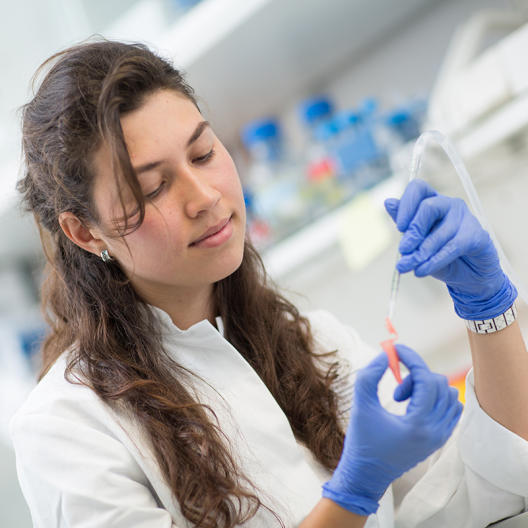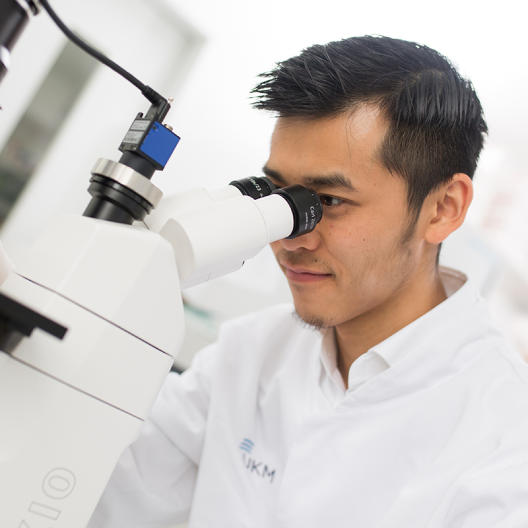A summer in the CiM lab

When Ekaterina Kozaeva, a master’s student, comes into the laboratory at the University Hospital Münster in the morning, she almost feels at home. At the Department of Anaesthesiology, Intensive Care and Pain Therapy she is researching into the molecular mechanisms which are responsible for the behaviour of immune cells and, in doing so, is carrying out biochemical experiments. But Ekaterina, 22, has only been working in the Münster lab for a few weeks. Normally she studies at Moscow State University and is visiting Germany for six weeks.
This was made possible by a programme of the Cells-in-Motion Cluster of Excellence (CiM) at the University of Münster. In this first CiM Summer School students from all over the world learn from scientists in the research association. 62 young researchers from 28 countries applied for one of the places, and ten were selected to take part. They come from Poland, Spain, Slovenia, Russia, China and Turkey. The fields of study they come from include for example biochemistry, molecular biology and biomedicine. During the Summer School each of them works in a different lab at the Cluster of Excellence, getting involved in a research project which they present in a small symposium at the end of their stay.
Ekaterina Kozaeva heard about the Summer School at her university in Russia, applied to take part and was selected for one of the fellowships. “In Russia I worked primarily with bacteria. What I’m doing here is something completely new for me,” she says. “I was a bit afraid at first, because I’m doing research on mice here for the first time and I didn’t know what to expect. But it’s really exciting to try out all these new techniques and areas of research. My colleagues here are already making jokes about how easy it is to get me enthused,” she adds with a laugh. Using the molecular-biological technique known as Western Blot, Ekaterina is looking into certain immune cells – neutrophils – to see how they behave in infections and inflammations. After just a few weeks in the lab she is proud of her first results.

Insights into a wide range of subjects
Just as proud is Hang Liu from China, who is also taking part in the Summer School. At the Institute of Cell Dynamics and Imaging, part of the Medical Faculty, he is looking into how, in inflammation, the protein actin reorganizes in cells. The 23-year-old came to Germany eight months ago to study for his master’s degree in cardiovascular science at Göttingen University. He already knew while he was still at school that he wanted to work in research – which his family couldn’t understand. “They would much rather see me working as an engineer in an office,” he says. Instead, his path took him into a lab, and so to Münster. “I’ve already learnt so many new things about basic research and my two supervisors are always on hand to give me advice,” he says. What he especially appreciates is the intense exchanges of ideas between individual institutes and scientists. “I gain insights into a wide range of subjects,“ – unlike in China, he explains, where researchers specialize much more strongly – and much earlier. Like all the students at the Summer School, twice a week he attends the series of lectures specially set up for them in which scientists from the Cluster of Excellence talk about their research topics of various disciplines.
The Summer School was initiated by Prof. Karin Loser and Dr. Kerstin Bartscherer, who head CiM research groups. “The Summer School is also a fantastic opportunity for us to get to know very good students from abroad and maybe attract them as PhD students for future research projects,” says Kerstin Bartscherer. “Both sides often have to make a decision after a short interview, and that can end up not working out. But in this case we have six weeks to get to know each other better.”
Ekaterina Kozaeva is certain that “the Summer School has contributed a lot in broadening my horizon and helping me find my way.” After she has completed her master’s degree in two years she wants to do a PhD and start a scientific career. “Since I’ve been here I’ve been thinking about going into medical research topics,” she says. Hang also plans to study for a doctoral degree after his master’s. Perhaps in Germany, maybe in England. Both students would like to return to Münster after their stay here – and not just because of the opportunities for research. “I really like the city,” says Hang, “and the Aasee is really beautiful.” All the Summer School students have already seen the sights of Münster and the city centre. “In a way, we’ve all become friends,” says Ekaterina, who does, however, miss her friends in Moscow a little. So she’s glad she’ll be back home at the end of August in time for her 23rd birthday. Hang also wants to go back and visit his family in China after the Summer School. But then he wants to get back to lecture halls and labs – to learn even more new things.

